Abstract
Bacterial attachment is believed to be an early step in gram-negative nosocomial pneumonia. The frequency of fimbria-associated adhesins among respiratory pathogens has not been studied in detail. In this study isolates belonging to the family Enterobacteriaceae, prospectively obtained from intensive care unit patients who were suspected of having nosocomial pneumonia, were examined for fimbria-associated adhesins. Type 3, P, type 1, and other fimbrial phenotypes were identified by specific hemagglutination and electron microscopy. The Klebsiella type 3 fimbrial phenotype was further characterized by using a monoclonal antibody. Also, both type 3 and Escherichia coli P fimbrial genotypes were detected by using DNA colony blot assays. The frequencies of genera or species isolated were as follows: Enterobacter (38.6%), Klebsiella (26.8%), Serratia (17.7%), E. coli (13%), and Proteus (5.2%). Isolates of Klebsiella oxytoca, K. pneumoniae, and Enterobacter cloacae most commonly possessed the type 3 fimbrial phenotype and genotype. The phenotype and genotype for E. coli P fimbriae (46.2 and 50%, respectively), a known pathogenic determinant in the urinary tract, were detected more frequently than expected. In addition, a previously unspecified hemagglutinin that was specific for porcine erythrocytes was almost uniformly expressed among isolates of Enterobacter aerogenes. Finally, the expression of the type 1 fimbrial phenotype was widely detected among the isolates tested but notably absent among K. oxytoca and Proteus mirabilis isolates. The frequency of the various fimbrial types identified suggests a role for these bacterial organelles in adherence to respiratory epithelia.
Full text
PDF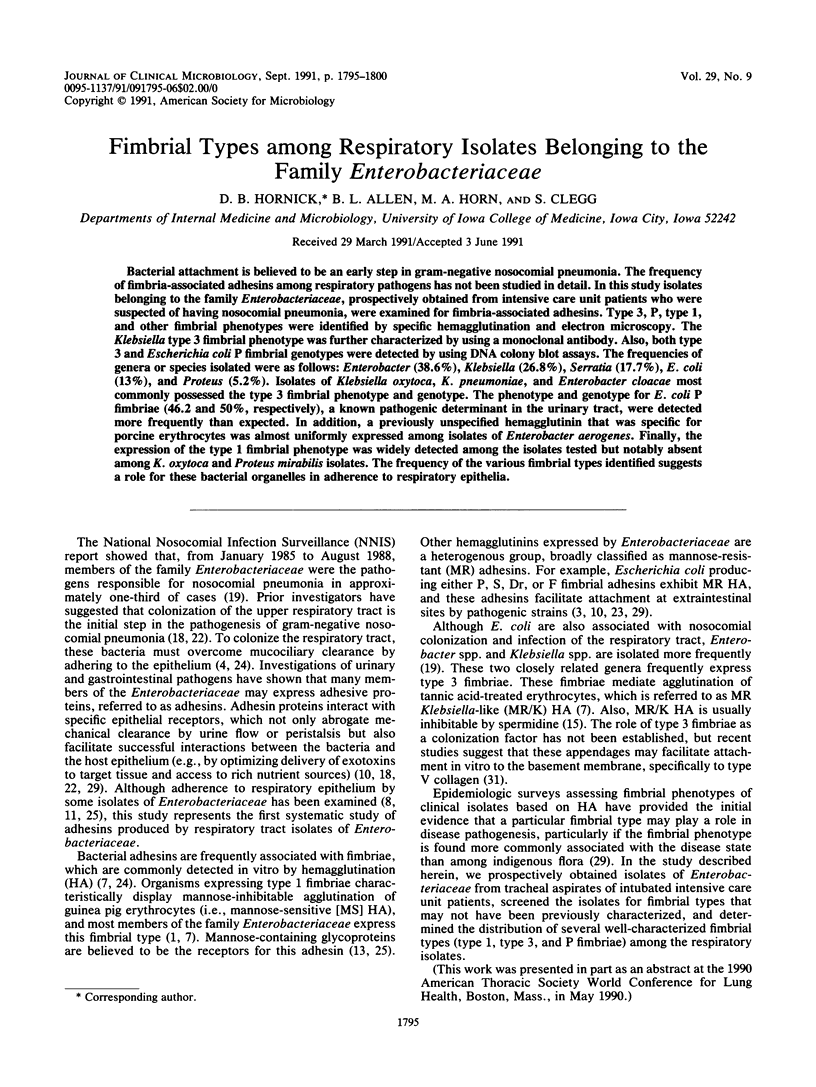
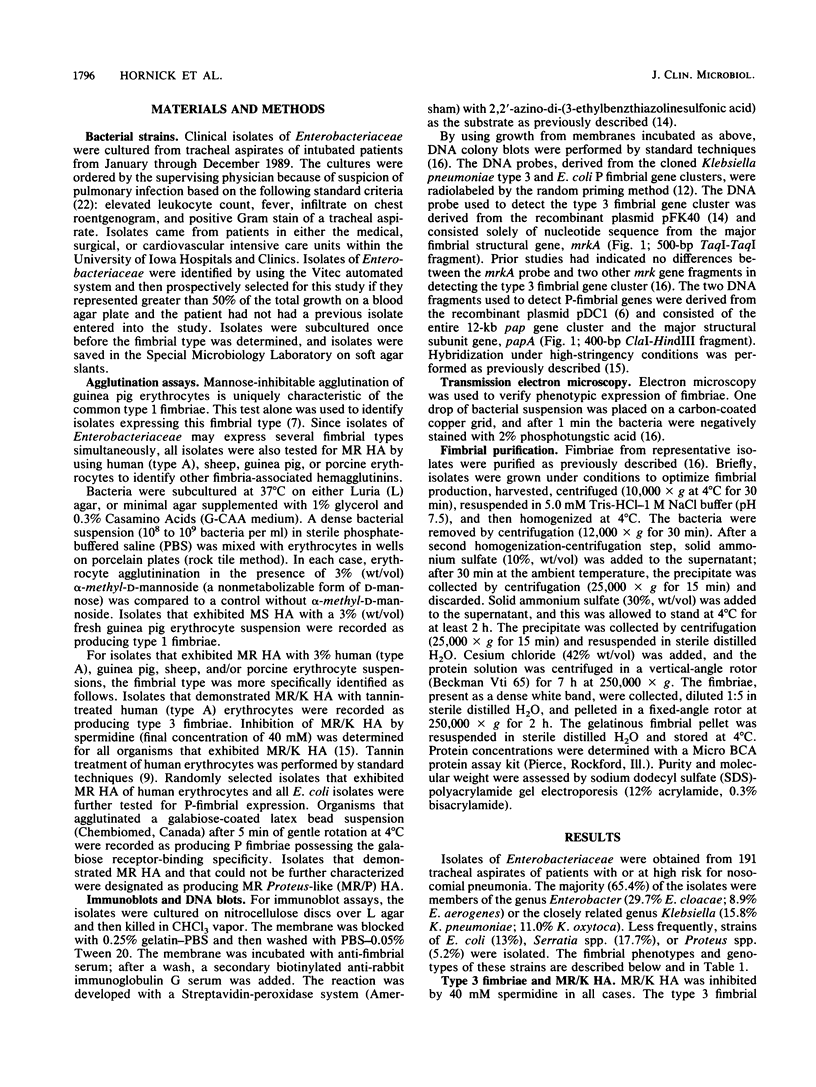
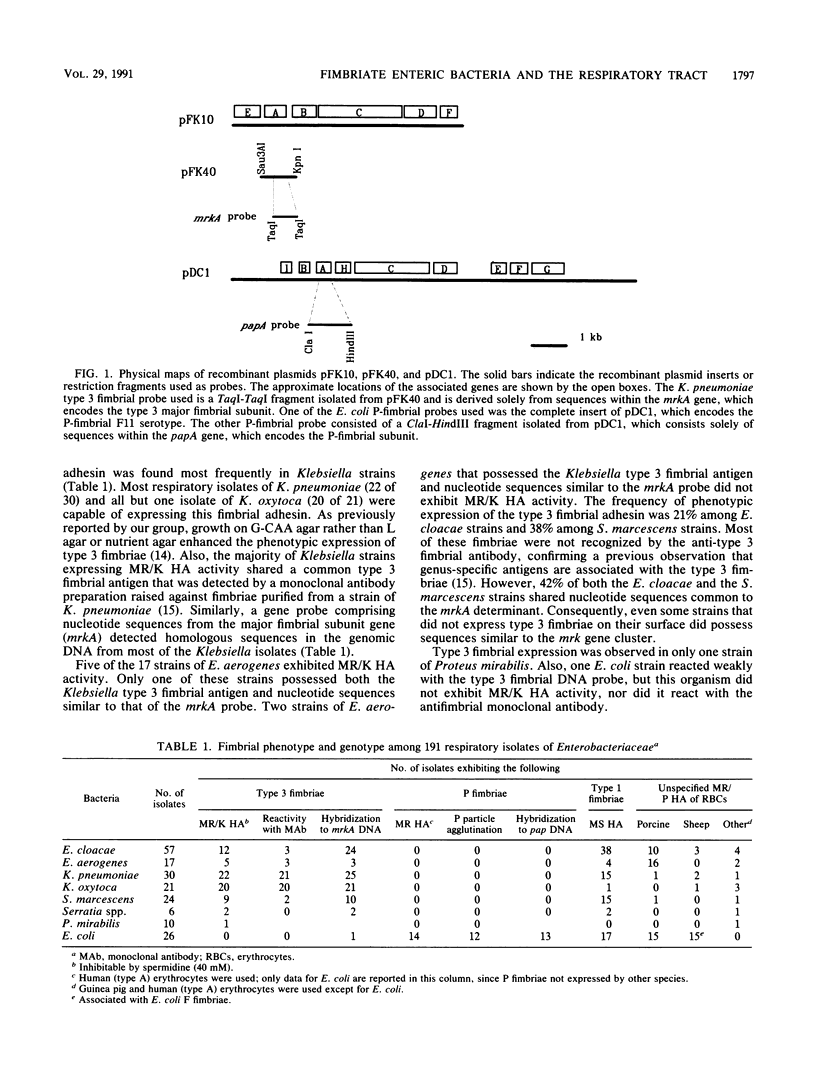
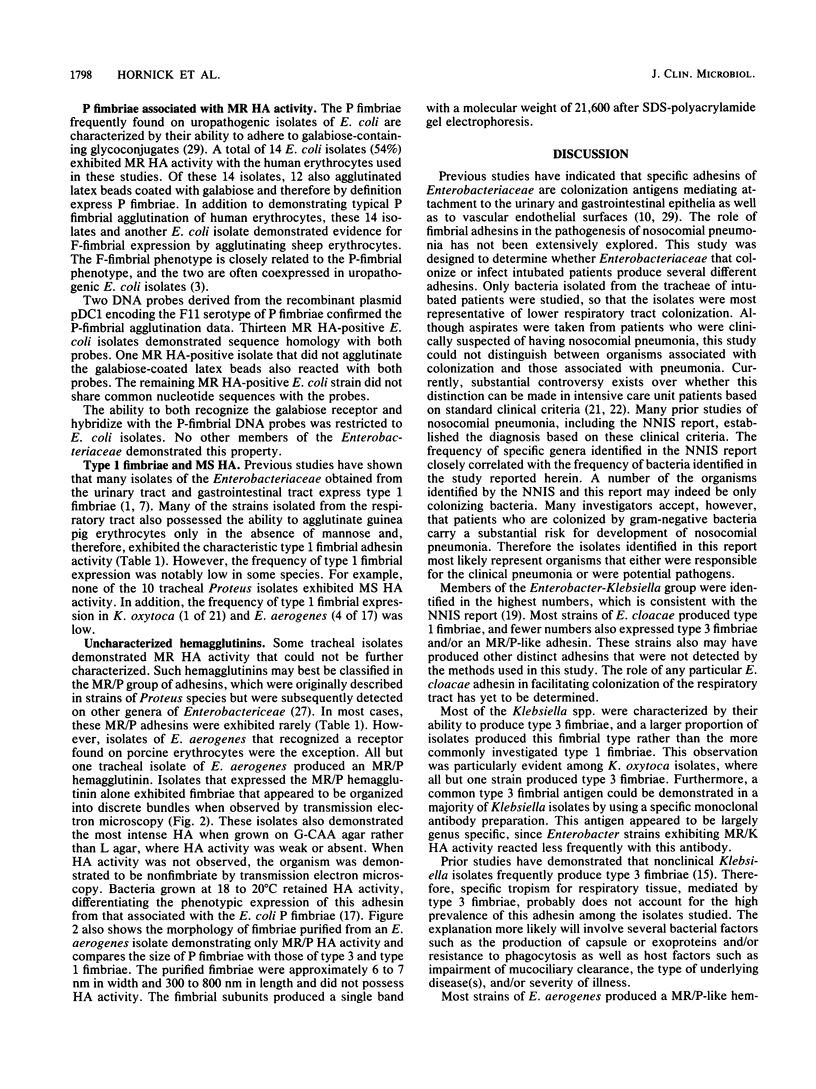
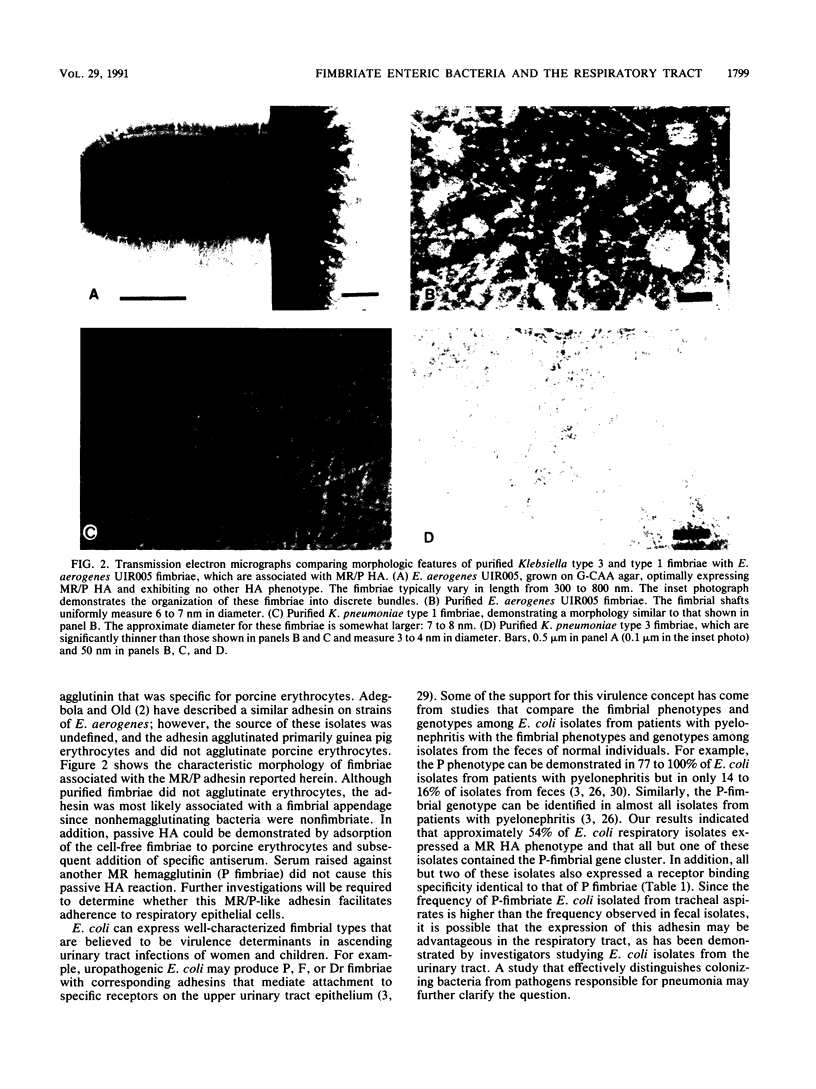
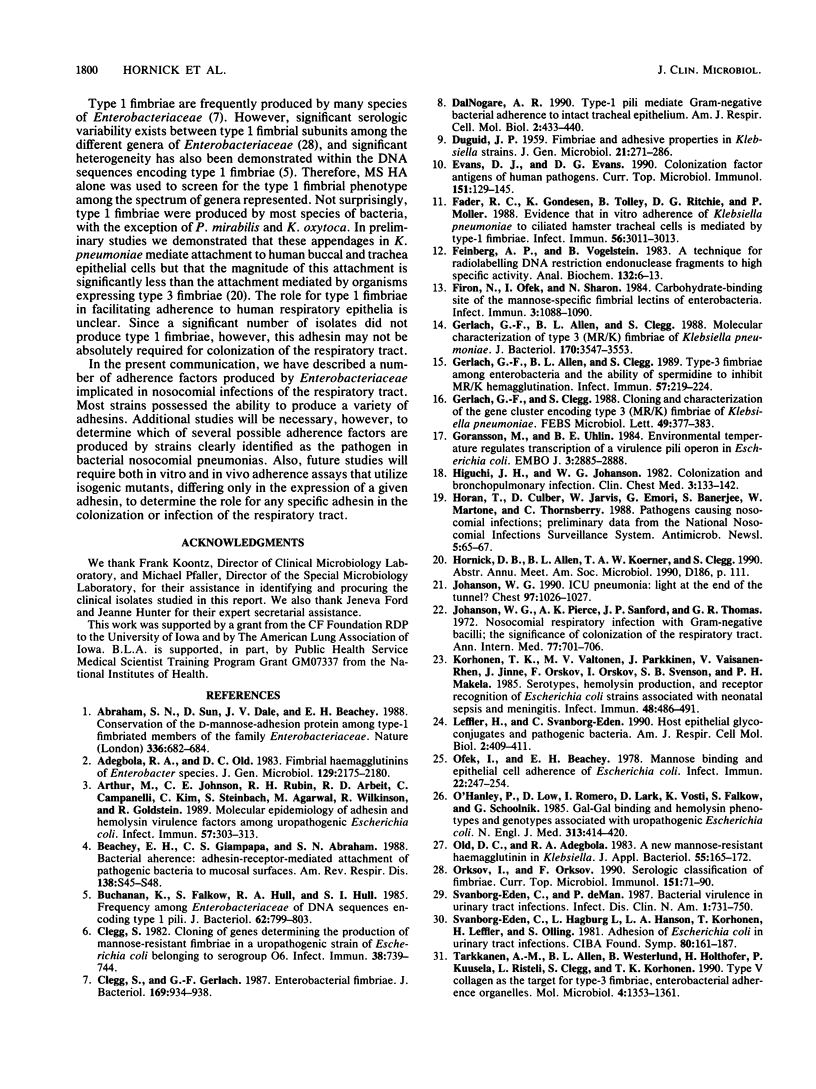
Images in this article
Selected References
These references are in PubMed. This may not be the complete list of references from this article.
- Abraham S. N., Sun D., Dale J. B., Beachey E. H. Conservation of the D-mannose-adhesion protein among type 1 fimbriated members of the family Enterobacteriaceae. Nature. 1988 Dec 15;336(6200):682–684. doi: 10.1038/336682a0. [DOI] [PubMed] [Google Scholar]
- Adegbola R. A., Old D. C. Fimbrial haemagglutinins in Enterobacter species. J Gen Microbiol. 1983 Jul;129(7):2175–2180. doi: 10.1099/00221287-129-7-2175. [DOI] [PubMed] [Google Scholar]
- Arthur M., Johnson C. E., Rubin R. H., Arbeit R. D., Campanelli C., Kim C., Steinbach S., Agarwal M., Wilkinson R., Goldstein R. Molecular epidemiology of adhesin and hemolysin virulence factors among uropathogenic Escherichia coli. Infect Immun. 1989 Feb;57(2):303–313. doi: 10.1128/iai.57.2.303-313.1989. [DOI] [PMC free article] [PubMed] [Google Scholar]
- Beachey E. H., Giampapa C. S., Abraham S. N. Bacterial adherence. Adhesin receptor-mediated attachment of pathogenic bacteria to mucosal surfaces. Am Rev Respir Dis. 1988 Dec;138(6 Pt 2):S45–S48. doi: 10.1164/ajrccm/138.6_Pt_2.S45. [DOI] [PubMed] [Google Scholar]
- Buchanan K., Falkow S., Hull R. A., Hull S. I. Frequency among Enterobacteriaceae of the DNA sequences encoding type 1 pili. J Bacteriol. 1985 May;162(2):799–803. doi: 10.1128/jb.162.2.799-803.1985. [DOI] [PMC free article] [PubMed] [Google Scholar]
- Clegg S. Cloning of genes determining the production of mannose-resistant fimbriae in a uropathogenic strain of Escherichia coli belonging to serogroup O6. Infect Immun. 1982 Nov;38(2):739–744. doi: 10.1128/iai.38.2.739-744.1982. [DOI] [PMC free article] [PubMed] [Google Scholar]
- Clegg S., Gerlach G. F. Enterobacterial fimbriae. J Bacteriol. 1987 Mar;169(3):934–938. doi: 10.1128/jb.169.3.934-938.1987. [DOI] [PMC free article] [PubMed] [Google Scholar]
- DUGUID J. P. Fimbriae and adhesive properties in Klebsiella strains. J Gen Microbiol. 1959 Aug;21:271–286. doi: 10.1099/00221287-21-1-271. [DOI] [PubMed] [Google Scholar]
- Dal Nogare A. R. Type I pili mediate gram-negative bacterial adherence to intact tracheal epithelium. Am J Respir Cell Mol Biol. 1990 May;2(5):433–440. doi: 10.1165/ajrcmb/2.5.433. [DOI] [PubMed] [Google Scholar]
- Edén C. S., Hagberg L., Hanson L. A., Korhonen T., Leffler H., Olling S. Adhesion of Escherichia coli in urinary tract infection. Ciba Found Symp. 1981;80:161–187. doi: 10.1002/9780470720639.ch11. [DOI] [PubMed] [Google Scholar]
- Evans D. J., Jr, Evans D. G. Colonization factor antigens of human pathogens. Curr Top Microbiol Immunol. 1990;151:129–145. doi: 10.1007/978-3-642-74703-8_7. [DOI] [PubMed] [Google Scholar]
- Fader R. C., Gondesen K., Tolley B., Ritchie D. G., Moller P. Evidence that in vitro adherence of Klebsiella pneumoniae to ciliated hamster tracheal cells is mediated by type 1 fimbriae. Infect Immun. 1988 Nov;56(11):3011–3013. doi: 10.1128/iai.56.11.3011-3013.1988. [DOI] [PMC free article] [PubMed] [Google Scholar]
- Feinberg A. P., Vogelstein B. A technique for radiolabeling DNA restriction endonuclease fragments to high specific activity. Anal Biochem. 1983 Jul 1;132(1):6–13. doi: 10.1016/0003-2697(83)90418-9. [DOI] [PubMed] [Google Scholar]
- Firon N., Ofek I., Sharon N. Carbohydrate-binding sites of the mannose-specific fimbrial lectins of enterobacteria. Infect Immun. 1984 Mar;43(3):1088–1090. doi: 10.1128/iai.43.3.1088-1090.1984. [DOI] [PMC free article] [PubMed] [Google Scholar]
- Gerlach G. F., Allen B. L., Clegg S. Molecular characterization of the type 3 (MR/K) fimbriae of Klebsiella pneumoniae. J Bacteriol. 1988 Aug;170(8):3547–3553. doi: 10.1128/jb.170.8.3547-3553.1988. [DOI] [PMC free article] [PubMed] [Google Scholar]
- Gerlach G. F., Allen B. L., Clegg S. Type 3 fimbriae among enterobacteria and the ability of spermidine to inhibit MR/K hemagglutination. Infect Immun. 1989 Jan;57(1):219–224. doi: 10.1128/iai.57.1.219-224.1989. [DOI] [PMC free article] [PubMed] [Google Scholar]
- Göransson M., Uhlin B. E. Environmental temperature regulates transcription of a virulence pili operon in E. coli. EMBO J. 1984 Dec 1;3(12):2885–2888. doi: 10.1002/j.1460-2075.1984.tb02225.x. [DOI] [PMC free article] [PubMed] [Google Scholar]
- Higuchi J. H., Johanson W. G., Jr Colonization and bronchopulmonary infection. Clin Chest Med. 1982 Jan;3(1):133–142. [PubMed] [Google Scholar]
- Johanson W. G., Jr, Pierce A. K., Sanford J. P., Thomas G. D. Nosocomial respiratory infections with gram-negative bacilli. The significance of colonization of the respiratory tract. Ann Intern Med. 1972 Nov;77(5):701–706. doi: 10.7326/0003-4819-77-5-701. [DOI] [PubMed] [Google Scholar]
- Johanson W. G., Jr Ventilator-associated pneumonia. Light at the end of the tunnel? Chest. 1990 May;97(5):1026–1027. doi: 10.1378/chest.97.5.1026. [DOI] [PubMed] [Google Scholar]
- Korhonen T. K., Valtonen M. V., Parkkinen J., Väisänen-Rhen V., Finne J., Orskov F., Orskov I., Svenson S. B., Mäkelä P. H. Serotypes, hemolysin production, and receptor recognition of Escherichia coli strains associated with neonatal sepsis and meningitis. Infect Immun. 1985 May;48(2):486–491. doi: 10.1128/iai.48.2.486-491.1985. [DOI] [PMC free article] [PubMed] [Google Scholar]
- Leffler H., Svanborg-Eden C. Host epithelial glycoconjugates and pathogenic bacteria. Am J Respir Cell Mol Biol. 1990 May;2(5):409–411. doi: 10.1165/ajrcmb/2.5.409. [DOI] [PubMed] [Google Scholar]
- O'Hanley P., Low D., Romero I., Lark D., Vosti K., Falkow S., Schoolnik G. Gal-Gal binding and hemolysin phenotypes and genotypes associated with uropathogenic Escherichia coli. N Engl J Med. 1985 Aug 15;313(7):414–420. doi: 10.1056/NEJM198508153130704. [DOI] [PubMed] [Google Scholar]
- Ofek I., Beachey E. H. Mannose binding and epithelial cell adherence of Escherichia coli. Infect Immun. 1978 Oct;22(1):247–254. doi: 10.1128/iai.22.1.247-254.1978. [DOI] [PMC free article] [PubMed] [Google Scholar]
- Old D. C., Adegbola R. A. A new mannose-resistant haemagglutinin in Klebsiella. J Appl Bacteriol. 1983 Aug;55(1):165–172. doi: 10.1111/j.1365-2672.1983.tb02661.x. [DOI] [PubMed] [Google Scholar]
- Orskov I., Orskov F. Serologic classification of fimbriae. Curr Top Microbiol Immunol. 1990;151:71–90. [PubMed] [Google Scholar]
- Svanborg Edén C., de Man P. Bacterial virulence in urinary tract infection. Infect Dis Clin North Am. 1987 Dec;1(4):731–750. [PubMed] [Google Scholar]
- Tarkkanen A. M., Allen B. L., Westerlund B., Holthöfer H., Kuusela P., Risteli L., Clegg S., Korhonen T. K. Type V collagen as the target for type-3 fimbriae, enterobacterial adherence organelles. Mol Microbiol. 1990 Aug;4(8):1353–1361. doi: 10.1111/j.1365-2958.1990.tb00714.x. [DOI] [PubMed] [Google Scholar]



